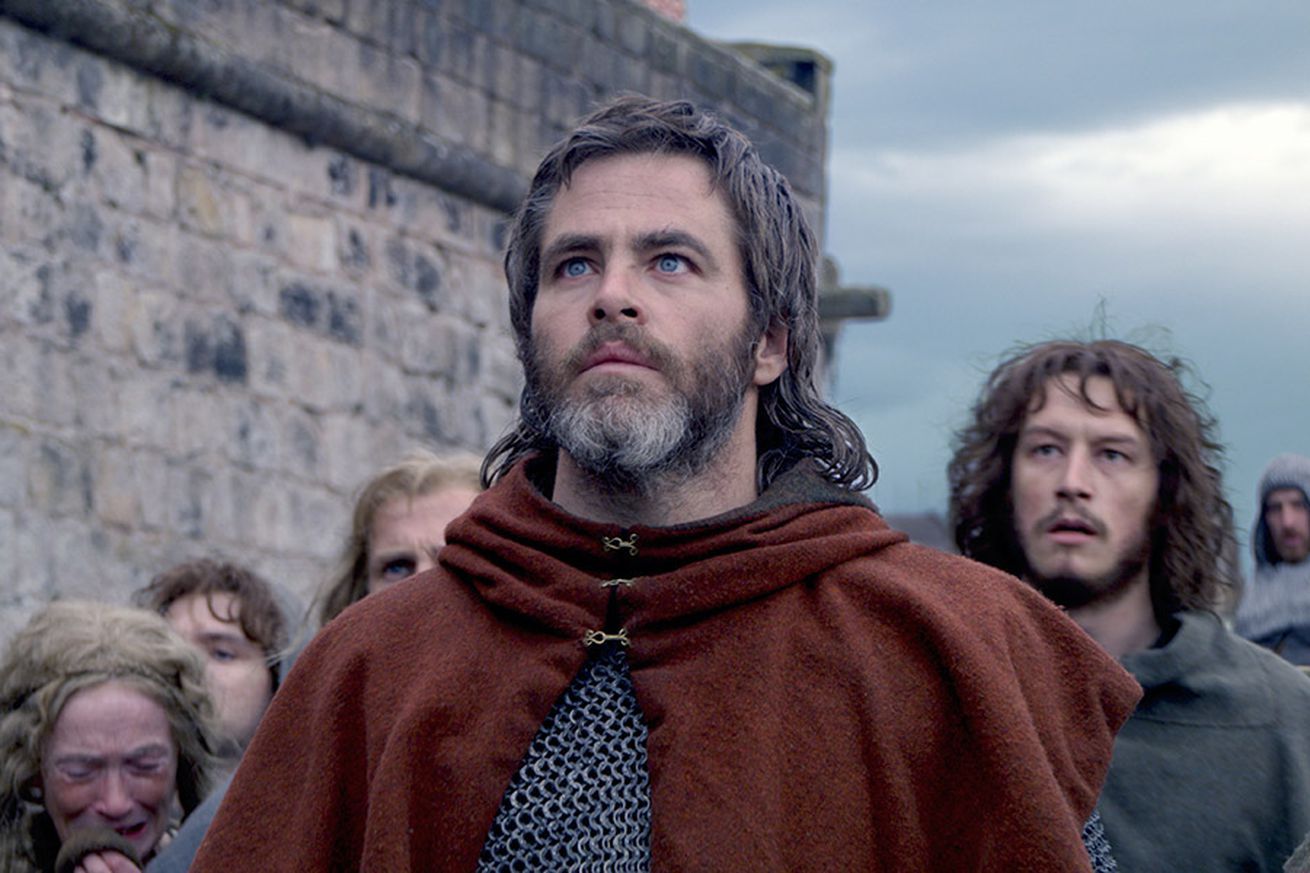
MPAA Rating: R | Rating: ★★★
Release year: 2018
Genre: Action, Biography, History Director: David Mackenzie
“Friends, join us. We have a spectacle!” So says King Edward I (Stephan Dillane) at the climax of Outlaw King‘s impressive opening shot, an uncut long take where the camera’s eye hovers in and out of mud-spattered English tents pitched on Scottish land. The camera captures a group of Scottish lords pledging their reluctant oath to Edward and his sniveling son, Edward II (Billy Howle). Among their ranks is Robert the Bruce (Chris Pine), Earl of Carrick and soon to be the semi-self-crowned King of Scots. The thing about King Edward’s statement is that Outlaw King never quite lives up to its spectacular opening. The nearly two hours between this opening sequence and the final gruesome Battle of Loudoun Hill are too small in scale to feel like a true historical epic, yet too wide to be an intimate character study or biopic. Forgoing blue face paint and 3+ hour running times, it’s certainly no Braveheart 2. You can decide for yourself if that’s a positive or a negative.
Outlaw King is often gut-wrenching, meaning men’s guts are being wrenched from their bodies in full display. In an uncharacteristically restrained touch, Mel Gibson depicted William Wallace’s disembowelment and quartering mostly off-screen in Braveheart. Not so in Outlaw King–there’s a scene where Edward II walks over to one of Robert’s brothers and essentially unzips his torso as the contents spill out. The camera never flinches. There are stabbings and impalements for both human and horse alike; indeed, for all the excellent horse-led films of 2018 (The Rider, Lean on Pete), Outlaw King is an anti-horse film, as many of them succumb to the same violent battle wounds as their riders. This film’s chosen aesthetic is Mud, Blood, and Mullet-like Mane. Friends, we may have a spectacle indeed. Or at least the attempt at one.
The narrative of Outlaw King plays out a bit like the biblical story of David, not the Goliath or Bathsheba episodes, but in David’s flight from King Saul (see 1 Samuel 21-24). Anointed to be the true king of the land, yet on the run from the arrogant man on the throne, both David and Robert resort to guerrilla warfare tactics (and a decent amount of luck/providence) to survive the reigning king’s pursuits. Robert is smart and strategic, and while not ever Scot chooses to band with him, they still appear to honor and respect him. There’s a brief scene where Robert and his small band of not-so-merry men trudge down a road, only to meet a somewhat hostile-looking group of Scottish warriors. The men eye Robert, but let him and his party pass unscathed (until a few scenes later, when they suddenly come back to wallop them, a narrative detail which still makes little sense upon reflection).
Pine gives a solid performance here as Robert (I’m of the opinion that he’s yet to give a truly bad performance, elevating even the poorest films by his charisma and skill). Yet we never quite get into the interior workings of Robert the Bruce. He’s a widower and a father, making the best of an arranged marriage to a young English woman of the aristocracy, Elizabeth (Florence Pugh), after Scotland loses the initial fight for freedom. Outlaw King depicts Robert as being someone who plays well with children and has an anachronistically egalitarian marriage–he tells Elizabeth that they’ll rule Scotland together–but also assassinates rivals on sacred ground, uses the church for political gain, and forgoes the code of chivalry when it suits his aims. Pine doesn’t explore the character of Robert so much as present him–and he really presents him in some full-frontal nude scenes. Still, I’m hard-pressed to come up with adequate adjectives to describe the characterization, as Robert just sorta is. It’s Pugh who impressed me more; her performance is commanding and demure, and she shines in the small number of scenes she’s given. When Robert and Elizabeth are separated halfway through the film during a night raid, it’s one of the more tragic scenes as he sends his wife and daughter away to safety, hoping to be reunited if they survive the night. Other supporting performances are fine, if a bit forgettable. Aaron Taylor-Johnson portrays Robert’s companion James Douglas with a Ben Foster-like craziness, a bit akin to his performance in Nocturnal Animals, only with a bad Scottish impression. The Scottish cast and crew are all excellent and authentic, especially James Cosmo and Tony Curran, making one wonder what a fully Scottish cinematic telling of Robert the Bruce’s story could have been.
The narrative of Outlaw King ends at the battle of Loudoun Hill, which is a few historical chapters too soon. There is no Battle of Bannockburn, no invasion of Ireland, no pilgrimages to St Ninian’s. As a cinematic spectacle, Outlaw King is perfectly fine, which is precisely what a “spectacle” shouldn’t be. Watching it while living in Scotland made me appreciate the real place and history all the more. It’s one thing to see it acted out on a screen; it’s even more enchanting to walk the green hills under the grey sky, to feel the wind blow like a living spirit hovering over the waters.
IMDB Listing: https://www.imdb.com/title/tt6679794/
Leave a Reply